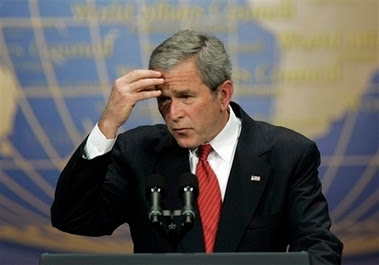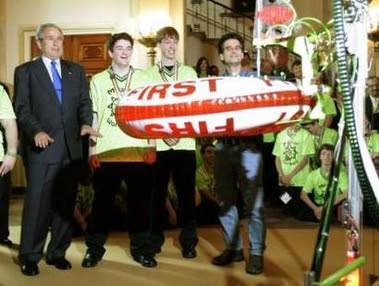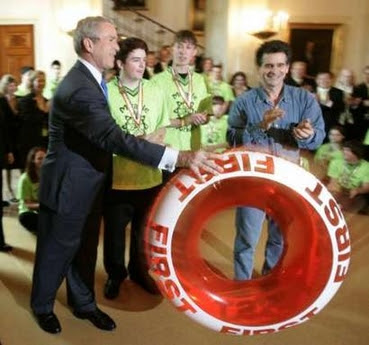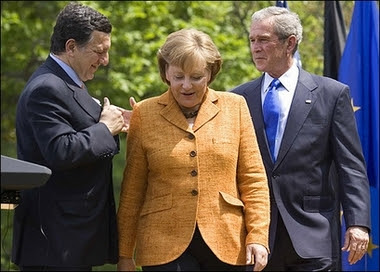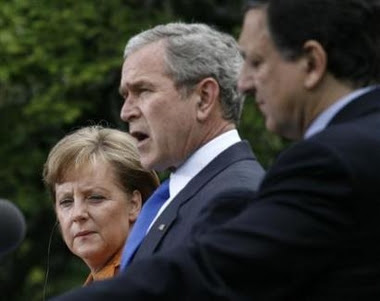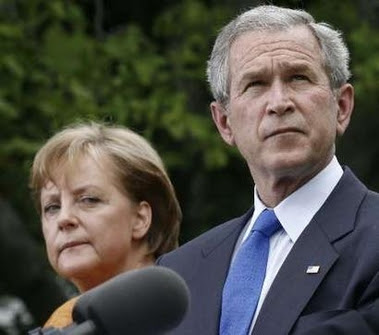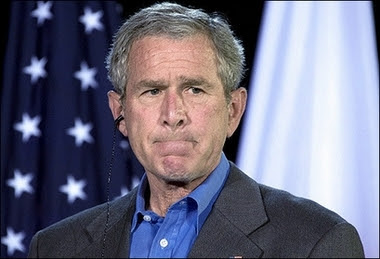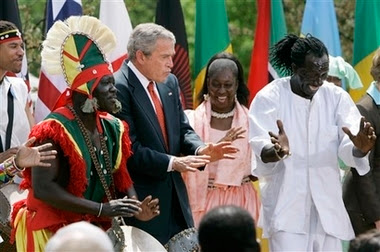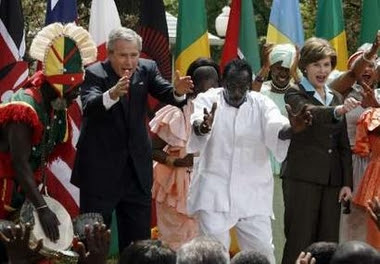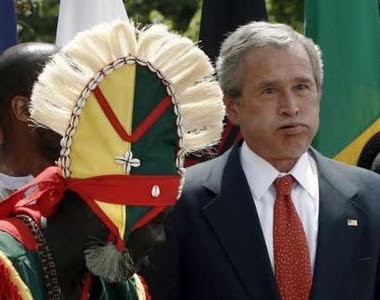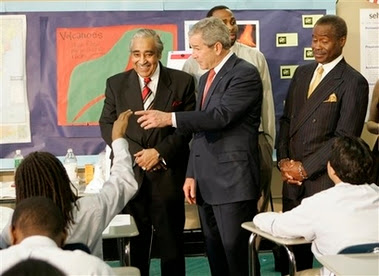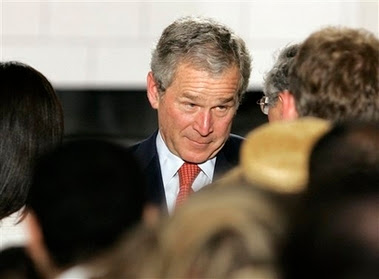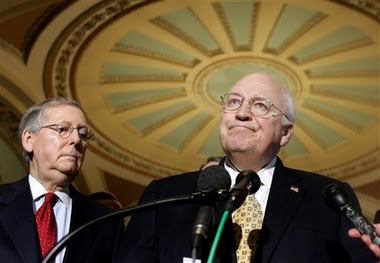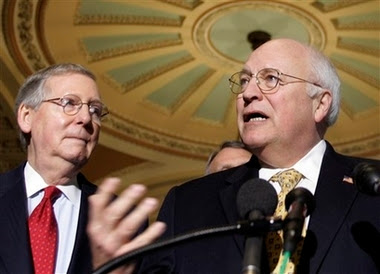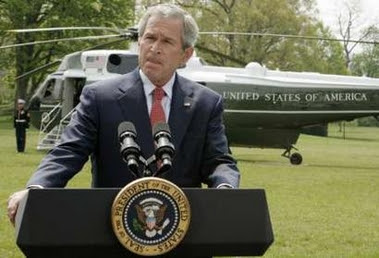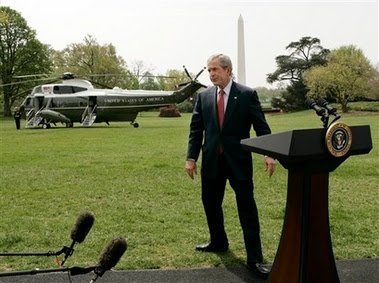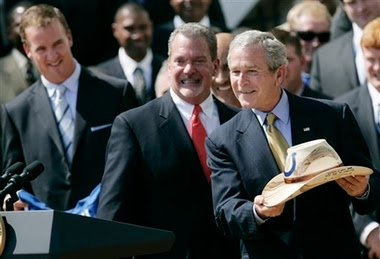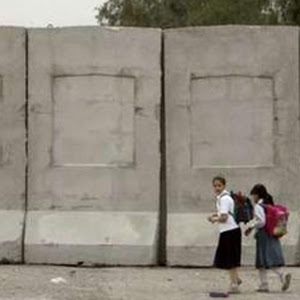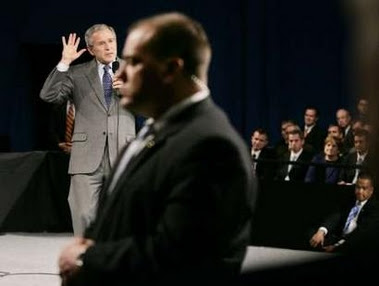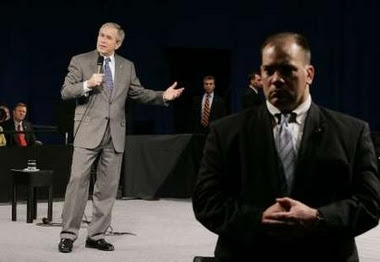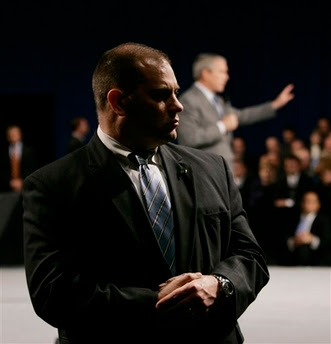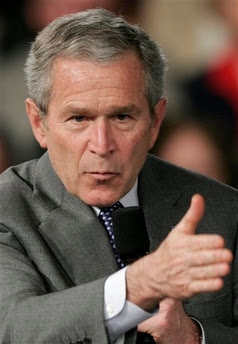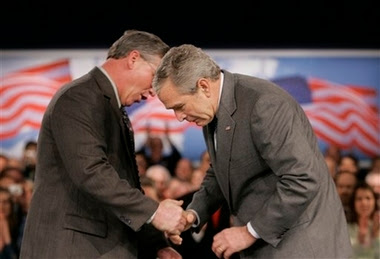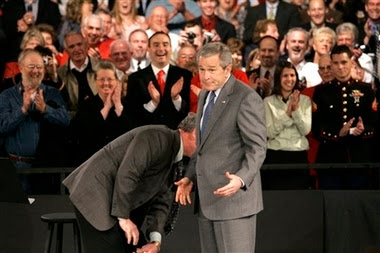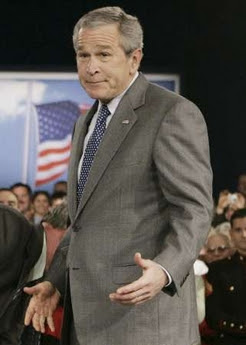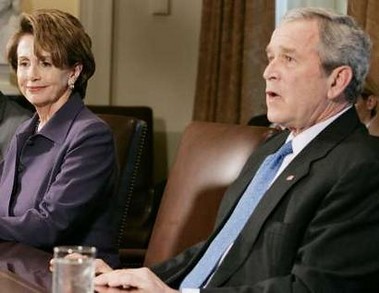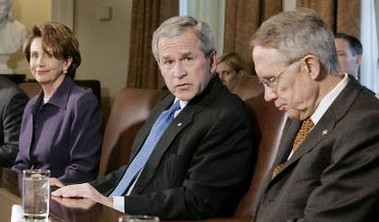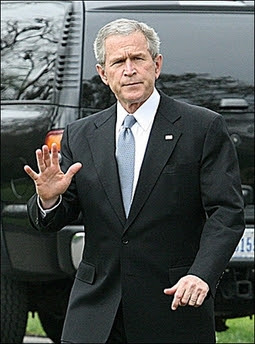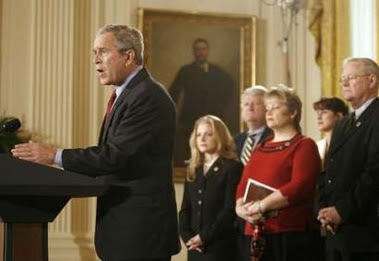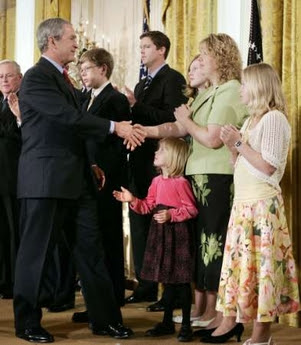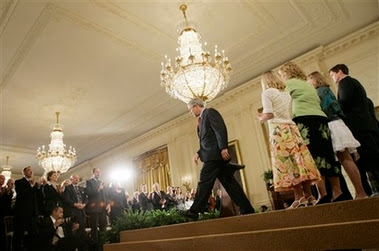Bush gave another
speech about The War Against Terror (TWAT) at another high school today, rather more coherent than yesterday’s until it got to the Q&A section, when the drugs kicked in. Something about the setting seemed familiar to me:
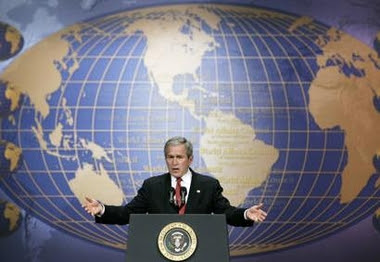
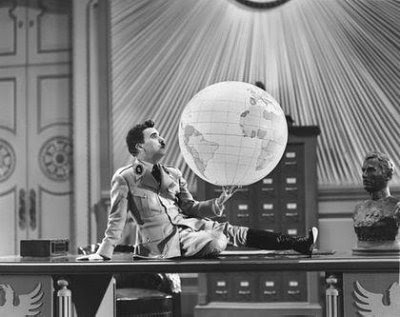
“My purpose of coming is to instruct,” he said. Hopefully not in the use and misuse of prepositions.
He continued to insist that the real source of all the trouble in Iraq is Al Qaida, and his evidence is just so compelling: “Here is a photo of the destruction caused by a car bomb at a bus stop in Baghdad on Wednesday. ... It has all the hallmarks of an al Qaeda attack. The terrorists bombed the buses at rush hour, with the specific intent to kill as many people as possible. This has been long a pattern of al Qaeda in Iraq; this is what they do.” I’m pretty sure Al Qaida doesn’t have a patent on “trying to kill as many people as possible.” But really, who needs evidence, when you can... speculate: “Remember, we believe most of the spectaculars, like the ones you saw -- I can’t tell you for certain Wednesday’s bombing was al Qaeda. In other words, I don’t have the -- I can speculate. But I can tell you a lot of the spectacular bombings have been al Qaeda.”
“It’s important,” he insisted, “for all Iraqis -- Sunnis and Shia alike -- to understand that al Qaeda is the greatest threat to peace in their country.”
And, of course, for Americans to “understand” the same. He insisted that TWAT is indivisible: “When we debate the war on terror, it can be convenient to divide up the fight by location -- and so we hear about, ‘the war in Afghanistan,’ and ‘the war in Iraq’ [as] if they were something separate. This is a natural way to talk about a complicated subject -- I don’t think it’s accurate. Our enemies make no distinctions based on borders.” Although they do like duty-free shops.
“The Iraqi security forces are growing in maturity and gaining trust, and that’s important.” Growing in maturity? What does that mean? They make fewer fart jokes?
Also growing: Nouri al-Maliki. “I’ve watched a man begun to grow in office.” Well, they water him every day.
“Precisely what happened in Afghanistan -- it’s really important for our memories not to dim. At least it’s important for my memory not to dim, because my most important job is to protect the American people.” Dim...
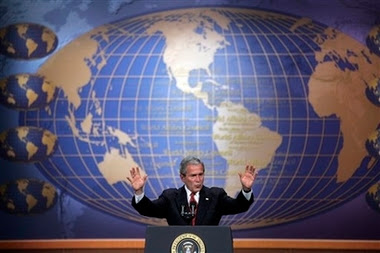
In the Q&A, he was asked something inaudible about the Democratic Congress and responded: “We have fundamental disagreements about whether or not helping this young democracy is -- the consequences of failure or success, let’s put it that way. It’s also very important in this debate to understand that even though we have our policy differences -- particularly as the young lad that you are -- that we don’t think either of us are not patriotic citizens, okay?” Yes, it’s very important to understand, um, what he said. You all understand, right? Because it’s very important to understand.
He trotted out once again the claim that everything was going swimmingly until a year ago: “And then what happened was, the Samarra bombing took place by al Qaeda, which caused there to be a sectarian outrage. And because the government was ill-prepared to provide enough security in the capital, people began to use militias to provide security. And the sectarian outrage, the killing started to get out of hand.” So there were no militias until 2006, and the killing wasn’t “out of hand” until then. What was that thing about memories dimming? He continued: “And I had a decision to make: withdraw from the capital and just kind of hope for the burnout theory -- as you know, I was worried about chaos, and into chaos comes more extremists”.
“And it’s also important for you to know that my thinking was deeply affected on September the 11th, 2001.” Yes, we could really really tell.

CONDESCEND MUCH? “One such democracy is Lebanon, a wonderful little country.”
IF YOU LIKE IT SO MUCH, WHY DON’T YOU MARRY IT? “and just so you know, I spend a lot of time listening to our military. I trust our military, I like our military, I’m impressed by our military.”
On the surge: “It was after this considered judgment that I made that decision, all aiming at some point in time. Now, the problem is, the Congress, many of whom think that it’s a good idea, however are unwilling to allow conditions on the ground to make the decisions as to when we can ever get there. I don’t have that luxury. I must allow conditions on the ground to dictate our position in order to make decisions.” And that’s his considered judgment.
On why we should never talk with Syria: “What happens when people go sit down with Bashar Assad, the President of Syria, he walks out and holds a press conference, and says, look how important I am; people are coming to see me; people think I’m vital.”
Ditto Iran: “Diplomacy works when people sit down at the table and need something from you. That’s how diplomacy works.” Normally, you’d spend years at diplomat school to learn that.
However, “the Iranian people.... must know that our beef with Iran is not with the people of Iran, it’s with the government of Iran that continues to make decisions that isolates you from the opportunities of a fantastic world.”
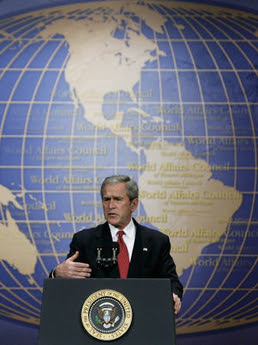
On disregarding public opinion: “There weren’t opinion polls when Abraham Lincoln was the President... but I just don’t think a President like Abraham Lincoln made a decision about whether all men were created equal based upon an opinion poll....” No, it was Jefferson who made a decision that all men were created equal based on an opinion poll. “...Nor do I make an opinion about my strong belief that freedom is universal, and there’s no debate. ... the guy asked a question the other day, you don’t like the opinion polls and all that stuff -- I said, any politician who says they don’t want to be popular, you know -- you can’t win if, like, 50-plus-one don’t like you for a moment.” I forget, who won the popular vote in 2000? “You can’t make your decisions, however, based on something that just changes; it just, poof.” So to reiterate, he has principles that are steady and unchanging, but the American people do not: “it just, poof.” We must really be such a disappointment to him.
On his “freedom agenda” in the Middle East (though warning, “it’s not like, I expect Jefferson democracy to be blooming in the desert”), he bragged, “I do have a good, very close relationship with King Abdullah of Saudi Arabia, and I’m proud of that relationship.”
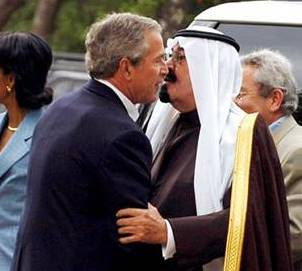
He praised the recent unfree Egyptian election as “quite modern and different,” said “there are women now serving in Kuwait parliament” (wrong), and claimed that in last year’s Palestinian elections (which he takes credit for: “I was criticized by some that upon insisting that the Palestinian elections go forward”), the Palestinian people were saying, “we’re sick of it. Arafat has let us down” (presumably by having been, you know, dead for over a year). He thinks the Palestinians will vote the right way next time, at least that’s what I think he said: “And hopefully, at some point in time, the situation will get clarified, if the people have another right to express themselves, and that right ought to be, are you for a state or not for a state? Are you going to have people that prevent a better future for emerging from you?” Clarified, he said.
Does anyone else have a headache?
